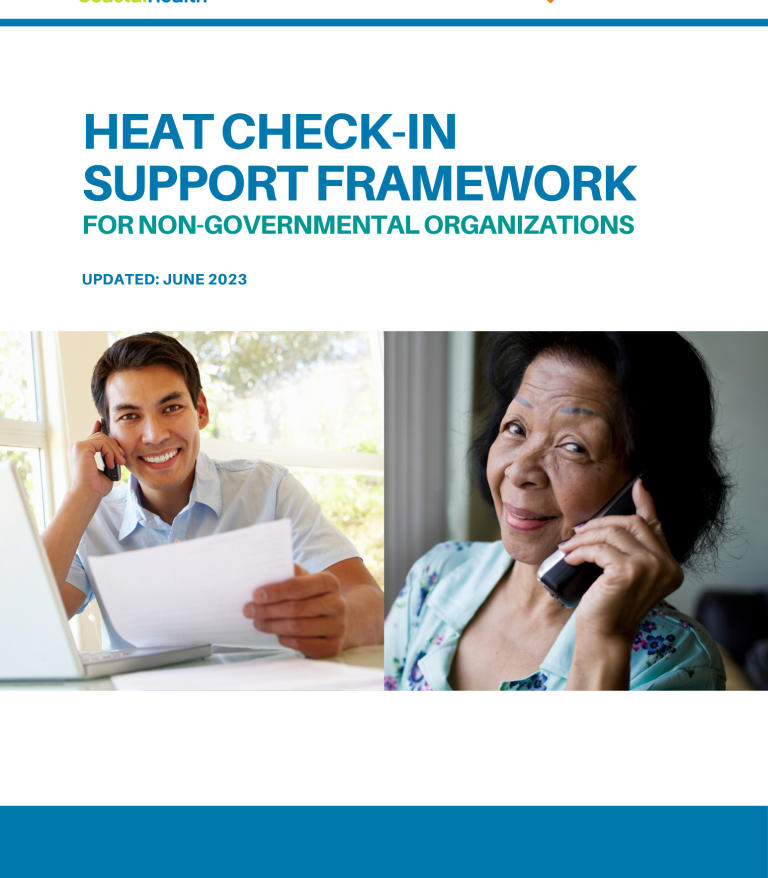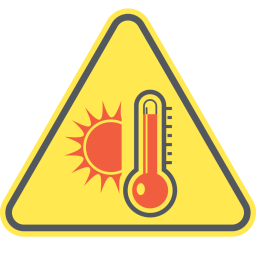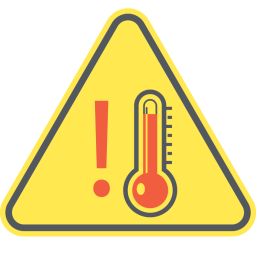Extreme heat
On this page
- リスクの高い人
- リスクの高い人
- Check-in with others
- 非政府系団体のためのVCHの高温時の安全確認サポートの枠組み
- Steps to protect yourself and others from heat
- How to check-in and support others during hot weather
- Cooling centres and cooling spaces
- “Heat Warnings” and “Extreme Heat Emergencies”
- Special considerations for mental health and substance use
- Extreme heat research and data
- 猛暑に関するリソース
- 医療関係者

極端な暑さはたいへん危険な場合があります。熱中症や熱疲労の兆候を始め、ご自身だけでなく近所の人やお友達、そしてご家族の健康を守るために暑さ対策の方法について知っておいてください。
リスクの高い人
暑さに対する反応は人によって異なり、人によっては健康被害のリスクがより高くなります。涼しさを保つことは次の人々にとって特に重要です。
- 60歳以上の高齢者
- 独り暮らしの人
- 糖尿病、心臓病、呼吸器系疾患などの既往症がある人
- 総合失調症、うつ病、不安症など精神障害のある人
- アルコールなど物質使用障害のある人
- 身体の不自由な人
- 粗末な簡易家屋に住んでいる人
- 暑熱の環境下で仕事をする人
- 妊娠中の人
- 乳幼児
これ以外の人も暑さの影響を受けることがあります。暑さに対する反応は一人ひとり違いますから、ご自分の身体が発する声に耳を傾けましょう。
リスクの高い人
暑さに対する反応は人によって異なり、人によっては健康被害のリスクがより高くなります。涼しさを保つことは次の人々にとって特に重要です。
- 60歳以上の高齢者
- 独り暮らしの人
- 糖尿病、心臓病、呼吸器系疾患などの既往症がある人
- 総合失調症、うつ病、不安症など精神障害のある人
- アルコールなど物質使用障害のある人
- 身体の不自由な人
- 粗末な簡易家屋に住んでいる人
- 暑熱の環境下で仕事をする人
- 妊娠中の人
- 乳幼児
これ以外の人も暑さの影響を受けることがあります。暑さに対する反応は一人ひとり違いますから、ご自分の身体が発する声に耳を傾けましょう。
Check-in with others
近所の人やお友達、そしてご家族が涼しく過ごしているか、そして暑さ対策の計画があるかどうか頻繁に確認してください。こうすることで人の命を救うことができます。前回熱波に襲われたとき大方の人は自宅で亡くなり、社会的に孤立していました。

非政府系団体のためのVCHの高温時の安全確認サポートの枠組み
Heat check-ins happen in a variety of settings and by staff or volunteers with diverse training. Given the wide context, this framework was created so organizations may select the information that is most relevant to their setting to develop their own organizational check-in plans.
高温時の安全確認サポートの枠組みをダウンロードSteps to protect yourself and others from heat
The most dangerous aspect of heat waves for most people is high indoor temperatures. Spending time in a cool space and drinking plenty of water is the best way to prevent heat-related illnesses.
Wildfire smoke can also cause health problems. During both wildfire smoke and heat events, consider also filtering your air using HEPA air cleaners. Find out more about wildfire smoke.
-
Keep yourself and other people cool
- Spend time in cooler indoor and outdoor spaces (i.e. community center, library or mall with air conditioning).
- Drink plenty of water and other liquids to stay hydrated, even if you do not feel thirsty.
- Cool off with a shower, bath or soaking part of your body in water.
- Wear a wet shirt or damp towels to cool down.
- Wear loose, light-coloured, breathable clothing.
- Limit activity, especially during the hottest hours of the day (generally 2 p.m. to 4 p.m. in B.C.).
- Watch for signs of heat exhaustion and heat stroke. For heat-vulnerable people, the risk for heat-related illness may increase at indoor temperatures over 26°C (78 °F) and may be very high at indoor temperatures over 31°C (88 °F).
-
Keep spaces cool
- During the day, close windows and shades/blinds to trap cooler air inside and block the sun.
- At night, open windows and doors when it is cooler outside (usually 9-10 p.m. in B.C.). Some bathroom and kitchen fans vent outside and can be used to remove warmer indoor air. Use portable fans to bring cool air into the home overnight.
- Consider getting an air conditioner for your home. If you have air conditioning, be sure to turn it on.
- Monitor indoor temperatures for yourself and those you are checking on. For heat-vulnerable people, the risk for heat-related illness may increase at indoor temperatures over 26°C (78 °F).
“Heat Warnings” and “Extreme Heat Emergencies”
In response to the 2021 BC heat dome, multiple health sector partners, and Environment and Climate Change Canada (ECCC) developed the BC Heat Alert and Response System (BC HARS). This two-level alert system lays out the criteria that ECCC will use to declare a Heat Warning (Level 1) or an Extreme Heat Emergency (Level 2), the appropriate public health messaging for both types of alerts, and the recommended actions for the health sector, local governments, and other partners.
Read more about the BC HARS on the BCCDC website.
Alerts
-

Heat Warning (Level 1)
Threat: Daytime and overnight temperatures are higher than seasonal norms and holding steady.
Action: Take the usual steps to stay cool and check on people at higher risk from heat. -

Extreme Heat Emergency (Level 2)
Threat: Daytime and overnight temperatures are higher than seasonal norms and getting hotter every day.
Action: Activate your emergency plan and check on people at higher risk from heat at least once a day.
Special considerations for mental health and substance use
For many, extreme weather can take a toll on mental health and well-being. Challenges with substance use can increase, and substance use can place people at high risk for heat-related illness. Don’t hesitate to get help when you need it. There are supports available.
-

Harm reduction
Keeping people and communities safe and healthy by preventing infections, illne…
-

Supervised Consumption and Overdose Prevention Sites
Supervised consumption and overdose prevention sites are safe spaces where team…
-

Mental health and substance use
Mental health and substance use services are available to provide support, serv…
猛暑に関するリソース
-
-
Public weather alerts for British Columbia -including heat and air quality alerts
Environment and Climate Change Canada
-
WeatherCAN App -weather alerts to smart phones, including heat and air quality alerts
Environment and Climate Change Canada
-
Hello weather – automated telephone weather service
Environment and Climate Change Canada
-
-
-
Extreme heat poster - English
Vancouver Coastal and Fraser Health
-
Extreme heat poster - Translated
Vancouver Coastal and Fraser Health; Available in: English, Arabic, Chinese-Simplified, Chinese-Traditional, Hindi, Korean, Farsi, Punjabi, Spanish, Urdu, Vietnamese and Gujarati
-
Health checks during extreme heat events
National Collaborating Centre for Environmental Health; Available in: English, French, Punjabi, Simplified Chinese, Traditional Chinese
-
Extreme heat preparedness guide
Prepared BC; Available in: English, French, Punjabi, Simplified Chinese, Traditional Chinese
-
Fans in extreme heat FAQ
Vancouver Coastal Health and Fraser Health
-
Build your own cool kit
Vancouver Coastal Health and the City of Vancouver (Find at the bottom of the page); Available in: English, Punjabi, Simplified Chinese, Traditional Chinese, Tagalog, Vietnamese.
-
Heat-related illness in infants and young children
HealthLink BC; Available in: English, Arabic, Chinese-Simplified, Chinese-Traditional, Farsi, French, Hindi, Japanese, Korean, Punjabi, Russian, Spanish, Tagalog, Ukrainian, Vietnamese
-
Prepared together for extreme heat
Building Resilient Neighbourhoods and Hey Neighbour Collective; Neighbour-to-neighbour connections may save lives during heat events. See tips to connect, learn, & collaborate with neighbours.
-
AC Care
Aboriginal Housing Management Association; Recommendations on safe and efficient operation of portable air conditioning units.
-
-
-
非政府系団体のためのVCHの高温時の安全確認サポートの枠組み
Vancouver Coastal Health and Fraser Health
-
Heat Check-In Training Video
Vancouver Coastal Health
-
Heat Check-Ins: Train-the-Trainer Video
Vancouver Coastal Health
-
Example heat check-in script
Vancouver Coastal Health
-
Heat check-In training slides
Vancouver Coastal Health
-
Heat check-in training: Train the trainer slides
Vancouver Coastal Health
-
Heat check-in practice scenarios
Vancouver Coastal Health
-
Heat check-in practice scenarios: Facilitation guide
Vancouver Coastal Health
-
Extreme weather check-in calls for multilingual seniors
MOSAIC. Available in multiple languages
-
Creating cooling spaces during hot weather: Guidance for community organizations
Vancouver Coastal Health
-
Emergency support for seniors framework
Renfrew Collingwood Senior’s Society
-
Heat stress information for workers
WorkSafe BC
-
Sample Heat and Wildfire Smoke Plan for Local Governments
Vancouver Coastal Health
-
Heat response planning for Southern Interior B.C. communities: A toolkit
Interior Health; Learn what your community can do to prepare for heat.
-
Outdoor Gatherings Guidance
Vancouver Coastal Health
-
-
-
How to be a heat-healthy business leader
Fraser Health
-
Heat stress information for workers
WorkSafe BC
-
Child care facilities and heat
Vancouver Coastal Health
-
Community care facilities and heat
Vancouver Coastal Health
-
Resource guide: Heat Planning
VCH and Health Emergency Management BC; How community care facilities can begin heat planning and recommended months for each step.
-
Heat Response Plan Template
VCH and Health Emergency Management BC; Fillable heat response plan template for community care facilities.
-
Site assessment checklist
VCH and Health Emergency Management BC; Detailed site and clinical checklists to assist community care facilities with heat planning.
-
Resident risk identification guidance
VCH and Health Emergency Management BC; Criteria to identify residents in community care facilities at highest risk from heat-related illness.
-
Heat response preparation checklists
VCH and Health Emergency Management BC; Brief checklist for community care facilities to complete before each heat season.
-
Heat response temperature log
Vancouver Coastal Health and Health Emergency Management BC; Indoor temperature recording template for community care facilities.
-
Heat response checklist
Vancouver Coastal Health and Health Emergency Management BC; Daily readiness check for community care facilities during heat alerts.
-
Heat-related illness: Prevention and Management in Community Care Facilities
Vancouver Coastal Health and Providence Health Care
-
Extreme Heat Guidance for Restaurants
Vancouver Coastal Health
-
Pool Operators on Extreme Heat and Smoke
Fraser Health
-
-
-
Summer heat, smoke and health: Recommended actions for owners and managers of rental and strata housing
Vancouver Coastal and Fraser Health
-
Resources to prepare buildings and facilities for extreme heat
BC Housing
-
Heat wellness check-in card for tenants
BC Housing
-
Creating cooling spaces during hot weather: Guidance for community organizations
Vancouver Coastal Health
-
医療関係者
-
-
Community care during extreme heat
Health Canada
-
Acute care during extreme heat
Health Canada
-
Health facilities preparation for extreme heat
Health Canada
-
Health facilities preparation for extreme heat
Health Canada
-
Technical guide for health care workers
Health Canada
-
For pharmacists (including medication risk factors)
Health Canada
-











